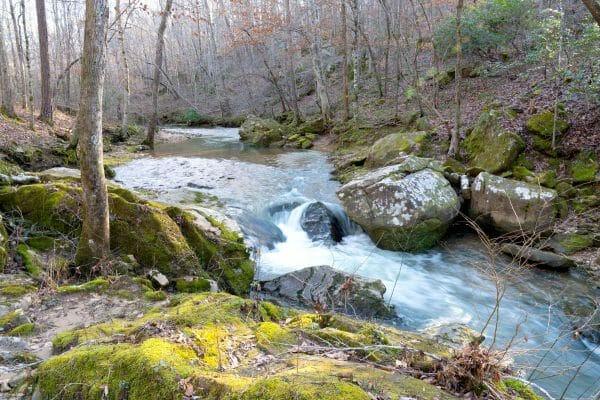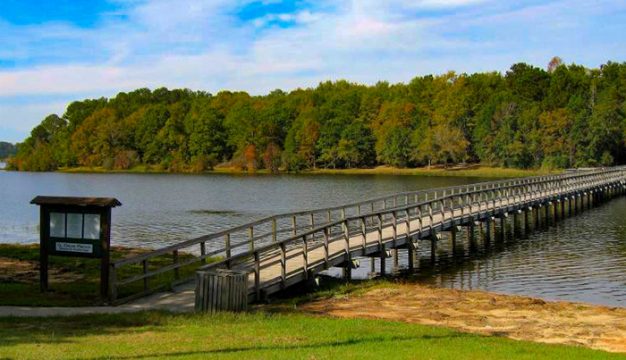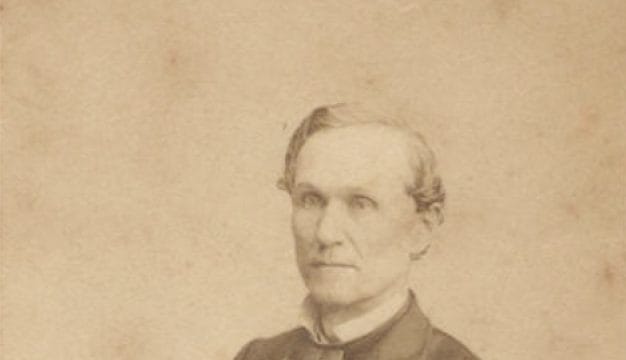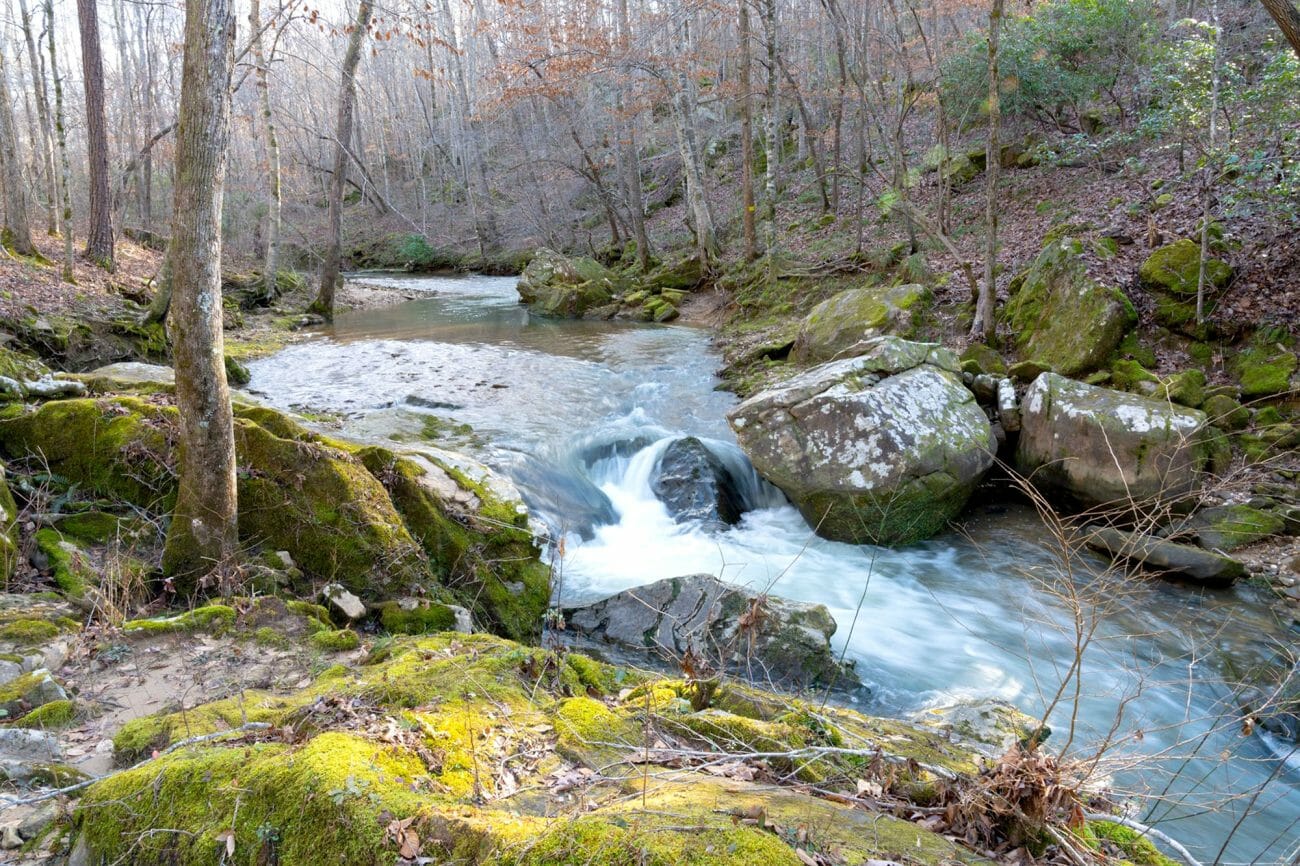Muscle Shoals National Heritage Area
 Rogers Hall
The Muscle Shoals National Heritage Area (MSNHA) is one of 49 heritage areas nationwide and the only one in Alabama. It includes the six counties of northwest Alabama adjacent to the Tennessee River: Lauderdale, Lawrence, Limestone, Colbert, Franklin, and Morgan. Like other National Heritage Areas, the MSNHA is part of the National Park Service (NPS) and encourages education about the area, promotes tourism to significant sites, and supports conservation and preservation of its culture and heritage. MSNHA's administrative office is in Florence, Lauderdale County, in historic Courtview, once the home of Gov. Emmet O'Neal and now Rogers Hall on the campus of the University of North Alabama.
Rogers Hall
The Muscle Shoals National Heritage Area (MSNHA) is one of 49 heritage areas nationwide and the only one in Alabama. It includes the six counties of northwest Alabama adjacent to the Tennessee River: Lauderdale, Lawrence, Limestone, Colbert, Franklin, and Morgan. Like other National Heritage Areas, the MSNHA is part of the National Park Service (NPS) and encourages education about the area, promotes tourism to significant sites, and supports conservation and preservation of its culture and heritage. MSNHA's administrative office is in Florence, Lauderdale County, in historic Courtview, once the home of Gov. Emmet O'Neal and now Rogers Hall on the campus of the University of North Alabama.
The origins of the Muscle Shoals National Heritage Area lie in a conference called "Muscle Shoals Reconsidered," organized by Nancy Gonce in 1999. It was followed by "Muscle Shoals Reconsidered II." Conference attendees discussed ways to promote the area's cultural and historical sites and led to the formation of two committees charged with finding ways to accomplish this task. In 2000, a study committee led by Gonce identified cultural assets and highlighted important stories connected to the region. Alabama congressman Robert "Bud" Cramer introduced legislation in the U.S. House of Representatives in 2001 that called for a study regarding the feasibility of declaring the Shoals a National Heritage Area. Supporters submitted a draft of the MSNHA Feasibility Study to the National Park Service in October 2005. The U.S. Congress officially established the MSNHA in March 2009 with the passage of the Omnibus Public Land Management Act of 2009, Section 8009.
 W. C. Handy Birthplace, Museum, and Library
The feasibility study identified three themes that described the MSNHA. "Mounds and Mussels: The Muscle Shoals Prehistory and Settlement" discussed how the Tennessee River's treacherous shoals affected trade routes and settlement. This category also encompassed Native American heritage in the region. "Harnessing the Mighty River: The Muscle Shoals in Times of War and Peace" covered issues such as the construction of Wilson Dam, the establishment of the Tennessee Valley Authority (TVA), and the area's role in national defense. In 1916, Congress passed the National Defense Act, which ordered the construction of a dam and locks in Muscle Shoals to provide hydroelectric power and improve navigation. The third theme was "Music and Modern Times: The Muscle Shoals and the River that Sings." Muscle Shoals has been referred to as the "Hit Recording Capital of the World" and has produced legends such as "Father of the Blues" W. C. Handy and record producer Sam Phillips, who discovered such stars as Elvis Presley and Johnny Cash. These themes not only highlighted the importance of the region's history and culture during the planning stages, they continue to be used in MSNHA's program planning today.
W. C. Handy Birthplace, Museum, and Library
The feasibility study identified three themes that described the MSNHA. "Mounds and Mussels: The Muscle Shoals Prehistory and Settlement" discussed how the Tennessee River's treacherous shoals affected trade routes and settlement. This category also encompassed Native American heritage in the region. "Harnessing the Mighty River: The Muscle Shoals in Times of War and Peace" covered issues such as the construction of Wilson Dam, the establishment of the Tennessee Valley Authority (TVA), and the area's role in national defense. In 1916, Congress passed the National Defense Act, which ordered the construction of a dam and locks in Muscle Shoals to provide hydroelectric power and improve navigation. The third theme was "Music and Modern Times: The Muscle Shoals and the River that Sings." Muscle Shoals has been referred to as the "Hit Recording Capital of the World" and has produced legends such as "Father of the Blues" W. C. Handy and record producer Sam Phillips, who discovered such stars as Elvis Presley and Johnny Cash. These themes not only highlighted the importance of the region's history and culture during the planning stages, they continue to be used in MSNHA's program planning today.
The MSNHA features a variety of attractions, such as the Alabama Music Hall of Fame, Belle Mont Mansion, the Black Warrior Wildlife Management Area, the Alabama Veterans Museum and Archives, Cook's Natural Science Museum, Cane Creek Canyon Nature Preserve, the Coon Dog Memorial Graveyard, the W.C. Handy Birthplace, Museum, and Library, the Courtland Heritage Museum, and the Rosenbaum House Museum. Together, these and other sites embody the diverse history and culture of the MSNHA.
MSNHA is a collaborative effort involving the U.S. Department of the Interior's National Park Service, the University of North Alabama, and communities within the heritage area. NPS provides matching funds for heritage area projects, and UNA serves as the fiduciary agent for the MSNHA. UNA also partners with the heritage area to provide graduate student workers and to sponsor programs such as the 2014 UNA Civil War Conference. Other partnership projects include Alabama's Roots of American Music Trail, which the MSNHA established in collaboration with the National Trust for Historic Preservation.
MSNHA staff carries out administrative duties and educational outreach programs. Graduate assistants and interns create resource packets that provide suggested activities for educators planning class trips to MSNHA historic sites. MSNHA also develops walking tours, driving tours, brochures, and rack cards for sites within its borders and offers a community grants program for historic preservation projects.








